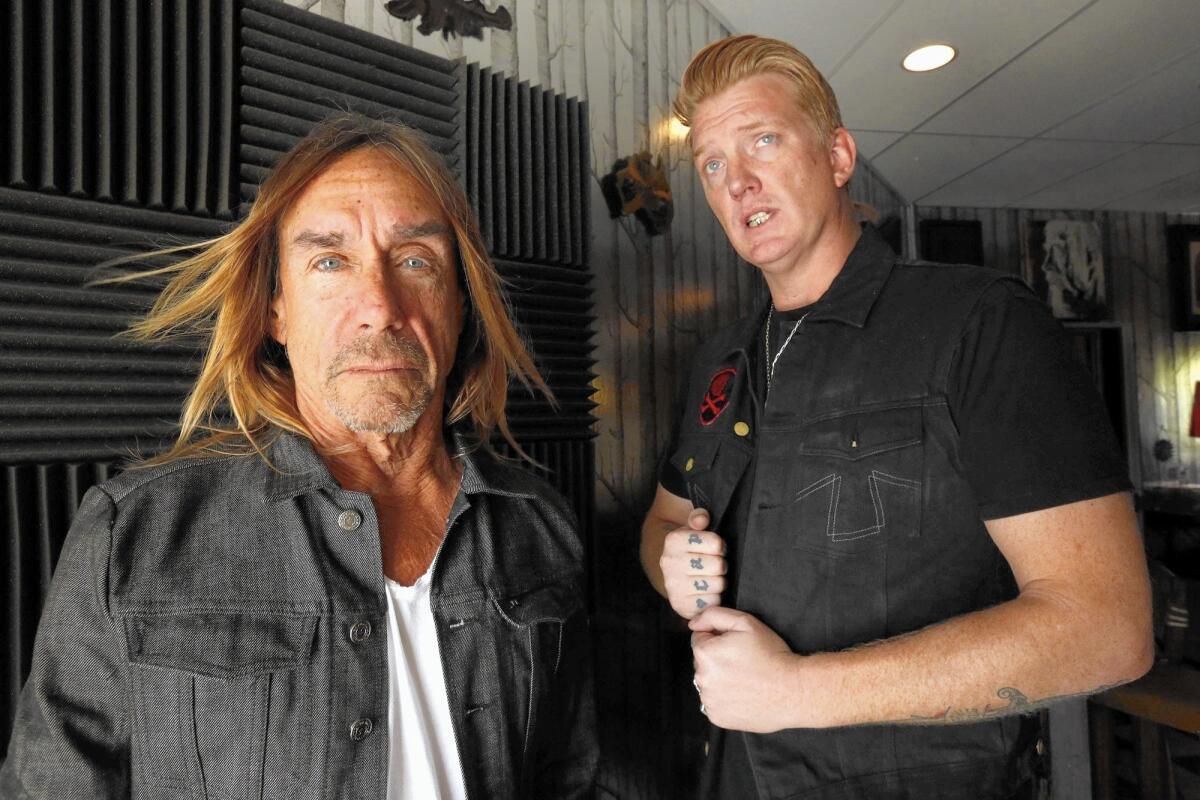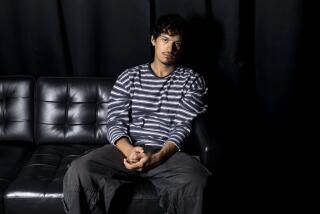Iggy Pop needed to break free. Joshua Homme aided and abetted. The result: the collaborative ‘Post Pop Depression’

The “dossier” landed in the hands of Joshua Homme with an unexpected jolt. It arrived ahead of a planned musical collaboration with proto-punk icon Iggy Pop, who sent materials for both to chew on: poems by Walt Whitman, a book of German trivia, Pop’s own poetry and writings about his sex life, and a detailed account of his fruitful collaboration with David Bowie four decades earlier in Germany.
There were 20 years of writings inside, and Homme was uncharacteristically stunned. The leader of Queens of the Stone Age had already talked with Pop on the phone for hours about recording together, but the packet raised the stakes significantly.
FULL COVERAGE: Spring 2016 arts preview | Exhibits | Theater | Dance | Pop music | Books
“When I got this dossier, it was like, what do you write back?” says Homme, who was moved and overwhelmed by the unusual package. He shared the contents with his wife, rocker Brody Dalle, who “cried when she saw it.”
The package was an early step toward Homme producing and performing on Pop’s new album, “Post Pop Depression,” released this past week on the Loma Vista label. It took him months to respond. Homme has normally avoided recording demos, preferring to immediately see a song idea to its result. But he finally sent Pop sketches for two songs that would later become key tracks on the album: “American Valhalla” and the haunted romance of “Break Into Your Heart.”
“I noticed his touch on the instrument. In today’s recording world, you don’t hear a lot of touch on any instruments,” Pop says with a laugh. “Not only can this guy song-write, he knows his way around a lyric, he can compose. He can play the guitar, he can play the ... drums, he can sing. And in effect, he has developed a production house. What am I going to do?”
The answer is in the album’s nine tracks, with Pop’s vocals both biting and purring through lyrics that are impressionistic and startlingly direct. His voice can be both snarling and debonair, set against layers of sound and texture from Homme, a muscular and sophisticated player of eccentric hard rock hooks, melody and swing.
Pop saw the potential of a partnership with Homme and the circle of gifted players in his universe. “You find you have building blocks for the things you want to say. They’ll generally ring true if they have a little of you, a little of other people, and then a little of the general smell — the zeitgeist.”
At 68, Pop has a long and rich history with collaborators, from guitarists James Williamson and Slash to Sex Pistols Steve Jones and Glen Matlock. Some of his most lasting work came in the records produced by Bowie, including the late ‘70s albums “Lust for Life” and “The Idiot,” which reintroduced Pop as a postmodern singer of danceable, brooding, forward-leaning rock that influenced generations of post-punk music makers.
“I love those records. They are amazing, and they really impacted my life,” says Homme, 42, as Pop looks on. “I just presuppose those records are made with passion and excitement and living together and enjoying that moment. That’s why they don’t sound like other things. That’s what we needed to do — two machetes, one jungle. It’s ‘We can make our mark too. Shall we?’”
Pop turned down a film acting gig to keep his calendar open and gave Homme various three-month windows when he was available. “It was so large, it was impossible to say no,” Homme says, “and I was like, ‘Oh, my God, he wants to do this.’”
For much of the last decade, Pop was focused on reconvening the Stooges, the manic Detroit garage act founded in 1967 that did much to create the sonic blueprint for the coming punk rock revolution. Even before the reunion ended with the deaths of founding band members Ron and Scott Asheton, Pop was contemplating a change of pace.
“There wasn’t much I could do with that that I didn’t do. I did my best,” Pop says of the two reunion albums he recorded under the Stooges name. “I was at a point where I needed a collaboration. I needed to do something that could bring out what I felt I could do. I felt stifled.”
In January 2015, Pop and Homme began with a few weeks at the Joshua Tree studio Rancho de la Luna, as Pop took in the cool desert winter. Joining them were guitarist-keyboardist Dean Fertita (QOTSA, the Dead Weather) and Arctic Monkeys drummer Matt Helders.
“It was never ‘OK, pull out the flag. Get my armor. We’re going to make an album,’” Pop says of those first sessions with Homme. “We were in that direction. Things were starting — but he’s been around. He knows we’re not going to just fly out there and get anything totally done. And it wasn’t going to get done easily.”
Nothing was announced. In the months before, Homme sometimes referred cryptically to a secret “wonderful” project without revealing details. There were no specific goals beyond the desire to work together and see where it would lead.
“It was his idea to keep it on the QT, which is really brilliant,” Pop says now. “One good thing about me is I don’t come with a record company or giant manager or a whole band or a contract. I’m free now at this point in my life. I did my time, I worked hard for it.”
Later sessions also unfolded in Burbank at Homme’s Pink Duck studio. On a recent morning, Pop and Homme are relaxed and laughing on the back patio, as airplanes fly overhead and trash trucks loudly roll up to the curb. Pop lives in Miami but is in town for interviews about “Post Pop Depression” and rehearsals for their coming tour, which lands at the Greek Theatre on April 28.
Pop is barefoot and clad in a T-shirt, and puts a leg up on an armrest. Homme has a cigarette and a parfait for breakfast.
As they talk, members of the band Eagles of Death Metal are loading in gear for a rehearsal. Recent events have collided the life-affirming and the traumatic with new intensity for Homme. In February came the birth of his third child, a son named Wolf, and a trip to Paris to play drums with EODM at the band’s first performance there since last year’s terrorist attacks, which included a massacre at the group’s Bataclan theater concert.
“Things converged by accident,” he says. “It’s interesting that the birth of my son, and Iggy and this Paris thing were all racing at 100 miles an hour at the same time. There was no way around it.”
Days later, Pop and Homme’s band are sharing a stage at the Teragram Ballroom downtown for a surprise show. The musicians wear matching suits with leopard lapels, ripping into the driving big beat of 1977’s “Lust for Life.” The singer leaps into view from behind an amplifier, a suit jacket over his bare chest, then dances along the stage, raising his middle fingers, throwing punches and rubbing his belly.
“Here comes Johnny Yen again,” he sings, leaning into the front rows, “With the liquor and drugs / And a flesh machine / He’s gonna do another strip tease!”
The band is larger too, with added layers of sound from QOTSA multi-instrumentalist Troy Van Leeuwen and bassist-guitarist Matt Sweeney. There is also the creep-show rhythm of 1977’s “Sister Midnight” and several new songs, including “In the Lobby,” a prickly, tribal rocker. The lyrics warn, “I hope I’m not losing my life tonight / And it’s all about the edge ... And it’s all about the sex,” Pop sings with a wicked smile. Homme stands nearby, slashing at his guitar, plucking hard on the strings, kicking into the air.
Homme is a few steps from his usual spot at the front of the stage, sometimes sharing smiles with Pop or leaning into a flinty guitar lead, closing his eyes with a look of joy, lost in the moment. He’s a man who likes to keep busy, with plans and obligations with Queens, EODM, other projects and a growing family.
“Apparently,” Homme says, “I would not have it any other way.”
[email protected]
ALSO:
Sony is betting on love for the Beatles lasting in a new $750 million deal
Radiohead announces concerts in Los Angeles, New York and Mexico City
More to Read
The biggest entertainment stories
Get our big stories about Hollywood, film, television, music, arts, culture and more right in your inbox as soon as they publish.
You may occasionally receive promotional content from the Los Angeles Times.











